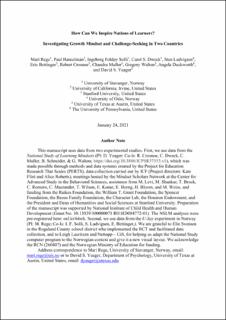How can we inspire nations of learners? Investigating growth mindset and challenge-seeking in two countries
Rege, Mari; Hanselman, Paul; Solli, Ingeborg Caroline Foldøy; Dweck, Carol S.; Ludvigsen, Sten Runar; Bettinger, Eric Perry; Crosnoe, Robert; Muller, Chandra; Walton, Gregory; Duckworth, Angela; Yeager, David Scott
Peer reviewed, Journal article
Accepted version
Permanent lenke
https://hdl.handle.net/11250/2740229Utgivelsesdato
2020-04Metadata
Vis full innførselSamlinger
Originalversjon
Rege, M., Hanselman, P., Solli, I.F. et al. (2020) How can we inspire nations of learners? An investigation of growth mindset and challenge-seeking in two countries. American Psychologist. Advance online publication. https://doi.org/10.1037/amp0000647 10.1037/amp0000647Sammendrag
Here we evaluate the potential for growth mindset interventions (which teach students that intellectual abilities can be developed) to inspire adolescents to be “learners”—that is, to seek out challenging learning experiences. In a previous analysis, the U.S. National Study of Learning Mindsets (NSLM) showed that a growth mindset could improve the grades of lower-achieving adolescents, and, in an exploratory analysis, increase enrollment in advanced math courses across achievement levels. Yet the importance of being a “learner” in today’s global economy requires clarification and replication of potential challenge-seeking effects, as well as an investigation of the school affordances that make intervention effects on challenge-seeking possible. To this end, the present paper presents new analyses of the U.S. NSLM (N = 14,472) to (a) validate a standardized, behavioral measure of challenge-seeking (the “make-a-math worksheet” task), and (b) show that the growth mindset treatment increased challenge-seeking on this task. Second, a new experiment conducted with nearly all schools in two counties in Norway, the U-say experiment (N = 6,541), replicated the effects of the growth mindset intervention on the behavioral challenge-seeking task and on increased advanced math course-enrollment rates. Treated students took (and subsequently passed) advanced math at a higher rate. Critically, the U-say experiment provided the first direct evidence that a structural factor—school policies governing when and how students opt in to advanced math—can afford students the possibility of profiting from a growth mindset intervention or not. These results highlight the importance of motivational research that goes beyond grades or performance alone and focuses on challenge-seeking. The findings also call attention to the affordances of school contexts that interact with student motivation to promote better achievement and economic trajectories.
Beskrivelse
© American Psychological Association, 2020. This paper is not the copy of record and may not exactly replicate the authoritative document published in the APA journal. Please do not copy or cite without author's permission. The final article is available, upon publication, at: https://doi.org/10.1037/amp0000647
